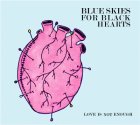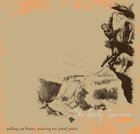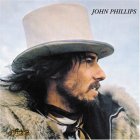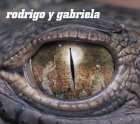5 Music Reviews
Blue Skies for Black Hearts, Love Is Not Enough (King of Hearts)

The song title "With a Rubber Soul" seems to stand out as a musical reference point, especially with it coming after a song (the album's title track) that takes a John Lennon solo song head-on and updates it, as a sequel of sorts. The British Invasion is certainly part of the Blue Skies for Black Hearts story, but it's not the whole thing, by any means. That "From a Rubber Soul" song is vaguely '60-ish, but sounds nothing like the Beatles; it's more psych-folk meets bossa nova. The album's personality overall is that of articulate, wellcrafted pop with a melancholy core the Go-Betweens often seem a more likely touchpoint than the Fab Four. Melancholy is the name of the game, overall. On Love Is Not Enough there's snappy pop-rock shuffles ("Back to New Orleans"), a tender pop ballad dedicated to a cat ("Otto"), and more
but loneliness is always at the center. It's a break-up album that doesn't drown itself in sorrow, musically, but instead has a lightness to it. It's bright, always pleasurable music, never overburdened with gloom-and-doom even as the songs themselves chronicle heartbreak, in all its stages. Even the band name turns out to be more a wish for hope than an expression of one, judging by the song "Turn My Black Skies Blue," which plays like an unfulfilled wish. The songs' characters may never find the closure they want, but for listeners Love Is Not Enough is an incredibly satisfying album. Everything's impeccably arranged, written, and played. It's a modern-day album filled with classic pop songs it harkens back to music-history's bright moments while sounding completely fresh. dave heaton
The Lovely Sparrows, Pulling Up Floors, Pouring on (New) Paint (Abandoned Love)

The Austin-based duo The Lovely Sparrows plays acoustic folk-pop music with an introspective demeanor on this 6-song EP. At first aural glance it resembles something like Bright Eyes with a bit of a Simon and Garfunkel wistfulness to it. Keep listening, though, and a more offbeat rock style emerges as well. The songs themselves often resemble Modest Mouse or Guided by Voices (for some reason the moment in "Your Flowers Will Bloom" where they sing "smooth jazz lovers reveal themselves today" is especially evocative of the latter band) songs, but played within in that more relaxed, rustic, intimate style. That mixing of styles is the chief reason this record is an intriguing one there's moments where it veers towards the routine, but then some unlikely combination looms forward. Best among them is "Attention Disorder Kid"
best because it most clearly, and most smoothly, takes these two almost contradictory directions and turns them into one. dave heaton
John Phillips, John Phillips (John the Wolfking of L.A.) (Varese Sarabande)

John Phillips (John the Wolfking of L.A. is a long-out-of-print album that was completely visionary. Phillips' first solo album, from 1970, is a work of laidback California country, but it also has touches of gospel and rock, excellently arranged vocal harmonies, and graceful orchestral leanings. One song feels like a showtune ("Mississippi"), another includes a tossed-off Louis Armstrong impersonation ("Down the Beach"). It benefits from this all, as well as Phillips' seemingly crystal clear sense of the direction he wanted the music to go. As his breaking-off album from the Mamas and the Papas, it's marked of independence. But it's also marked by the late '60s/early '70s crossroads from which it came. There's confusion, anguish, hope, sadness, free-love dreams crashing, freedom hitting darker realities and surviving. To listen to a track like "Topanga Canyon" or "Someone's Sleeping" is to hear all of these feelings and ideas at once. It's a purely American album, one with a lovely ocean/sunny afternoon setting that jibes with the conveyance of pain, and the healing of it. It ends with an elegant, moving song about a cross-country trip of moving-on, "Holland Tunnel." And on this reissue that's not even the end there's 8 more songs, some completely fresh and some variations on the album tracks. This version of John the Wolfking of L.A. revives a classic and expands our view of it too. dave heaton
Rodrigo Y Gabriela, self-titled (ATO)

Arresting acoustic-guitar duo Rodrigo Sanchez and Gabriela Quintero play Latin folk music nimbly and accurately but with aggression to match the precision. Their rock n' roll spirit can be detected right from the start, from the fiery first two tracks, "Tamacun" and "Diablo Rojo". It's about the speed in which they play, but not just the speed, also the spirit. This rock rebel side is clear well before they cover Metallica ("Orion", often surprisingly beautiful) and, perhaps an even braver step, Led Zeppellin's unfortunately immortal "Stairway to Heaven," which they open up like it's brand new. Whenever the music seems likely to fall into a rut, they do something to bring it quickly to life, whether it's a breathtaking appearance by Hungarian violinist Roby Lakatos (on "Ixtapa") or their own habit of taking their music off an unexpected cliff. dave heaton
Scott Solter Plays Pattern Is Movement, Canonic (Hometapes)

The words "Scott Solter Plays Pattern Is Movement" mean exactly what they say. Engineer/producer/sound scientist Scott Solter takes the atmospheric post-rock band Pattern Is Movement's 2005 album Stowaway and gives it his own version of atmosphere through a world of splicing, dicing, fogging up and clarifying techniques. Guitar lines, and occasionally vocals, from the original album carry though, yet everything is disjointed, shaken up, taken on a ride through outer space. Sometimes it sounds like we're viewing the music through strobe lights, as on "Abrade the Beat." Canonic is a brilliant dub-style "version" rooted in his own tastes and interests as much as the band's. It's amazing to think that he's only used the original recording to create this, with nothing added, as it sounds like alien forces have invaded. Or at the very least, like earthquakes and hurricanes have taken hold. Solter has such a careful ear, and mind, for sound, and it shows at every second. Here he cracks the album and reinvents it. Either he's cracked the Pattern Is Movement code, or he's rewritten the album in a new code either way, Canonic is a beauty. dave heaton
Copyright (c) 2006 erasing clouds |
|